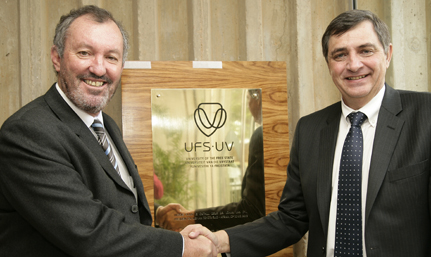Latest News Archive
Please select Category, Year, and then Month to display items
12 January 2024
|
Story Nonsindiswe Qwabe
|
Photo Sonia Small
 Since joining the UFS in 2008, Dr Grey Magaiza has worked extensively on approaches that can foster the socio-economic transformation of societies.
Since joining the UFS in 2008, Dr Grey Magaiza has worked extensively on approaches that can foster the socio-economic transformation of societies.
“The future should be one where communities can decide on their development agenda and futures. That’s the most important for me.” Dr Grey Magaiza, Deputy Director of the Centre for Gender and Africa Studies (CGAS) and Head of the Community Development programme on the Qwaqwa Campus, is passionate about capacitating communities to be agents of change and advancement. His vision for the future emphasises the empowerment of communities to take charge of their development by actively participating in decision making and the implementation of development projects that can improve their lives.
Since joining the UFS in 2008, Dr Magaiza has worked extensively on approaches that can foster the socio-economic transformation of societies. Over the years, he has crafted his research speciality into one that he is most proud of – being an interdisciplinary scientist immersed in the development of communities.
“I’m in a fortunate position of researching what I like. I say ‘fortunate’, because I’ve taken the time to understand what I’m passionate about, which is the overall field of rural livelihoods and livelihood futures – in short, community development. My research starts from an engaged university, understanding the elements that a university must use to enhance transformation and relevance to its immediate community in terms of development.”
One of the ways he has done this is by looking at social entrepreneurship as a development approach for young people in a rural setting. Through workshops with non-profit and civic organisations in Qwaqwa, Dr Magaiza has been helping these organisations to map out their needs and actively meet them through the involvement and support of external role players.
“We understand that communities are part of the national development agenda, but even that national agenda respects community knowledge and intentions and allows communities to shape their identity. A critical enabler of this is community organising. You bring back the capacity in communities to have dialogues on issues affecting them as spaces for engagement, knowledge exchange, and for people to just talk about their way forward.”
By enabling communities to define their development agenda, they can address their specific needs, challenges, and aspirations, he said. “When I look at livelihood futures, it’s quite an exciting aspect of my work – it’s like looking into a fortune tellers’ globe, because you’re not deciding for communities what they should do, but the communities themselves take those decisions.”
New Albert Wessels Auditorium officially unveiled
2013-05-19
|
 |
Dr Johan van Zyl (President and Chief Executive Officer (CEO) of Toyota South Africa and CEO for Toyota Africa) and Judge Ian van der Merwe (Chairperson of the UFS Council) unveil the redesigned Albert Wessels Auditorium.
Photo: Johan Roux
20 May 2013 |
The swanky new interior and entrance of the Albert Wessels Auditorium WA) were officially unveiled on Bloemfontein Campus of the University of the Free State (UFS) on Friday 10 May 2013.
Prof Jonathan Jansen, UFS Vice-Chancellor and Rector, and Judge Ian van der Merwe, Chairperson of the UFS Council, presided over the AWA unveiling ceremony. They were joined by a special guest, whose company has a long affiliation with the UFS and the AWA in particular.
Dr Johan van Zyl, the current President and Chief Executive Officer (CEO) of Toyota South Africa and CEO for Toyota Africa, unveiled the commemorative plaque at the new entrance. Dr Van Zyl reaffirmed the relationship between Toyota South Africa and the UFS, which can be traced back to the founder of his company.
The namesake of the AWO was the founder of Toyota South Africa. Dr Wessels was at one time married to Elizabeth Eybers, the acclaimed poet who won the Hertzog Prize in 1934 and 1971. Could she have inspired Wessels’ love of the arts? Regardless, the AWA will serve as a world-class facility for the arts, corporate meetings and seminars, from now on. The AWA can now seat 196 people on its luxurious red leather seats.